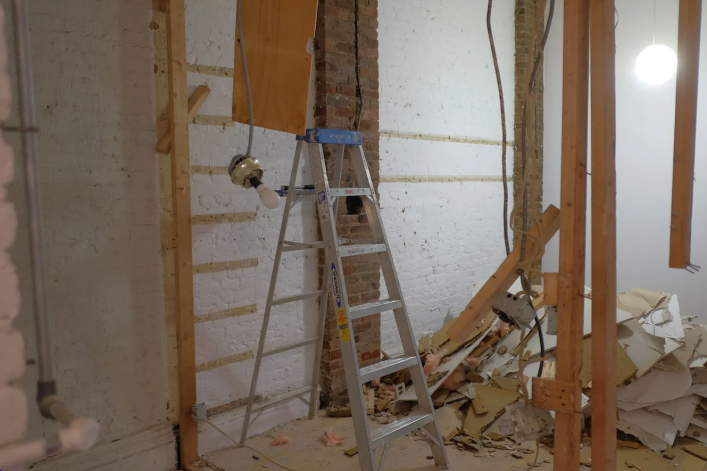Could a more careful online search have stopped the ‘Monster Tenant’?
- In an article on Curbed, owner Suzanne Seggerman said she was deceived by ‘mostly falsified’ documents
- Under Local Law 24, landlords face new regulations for conducting credit and criminal background checks

Suzanne Seggerman's Noho loft after tenant Han Lo demolished walls and tore out fixtures.
Photo courtesy of John Maher.
There’s a pivotal moment in “My Monster Tenant,” a story published on Curbed that echoes the plot of ’90s psychological thriller “Pacific Heights.” In the article, owner Suzanne Seggerman described how her prized Manhattan loft was inexplicably demolished by her tenant. Shocked by the discovery, she did another online search for the tenant, looking for something in his background that she missed.
When she found a clue, the moment was gut wrenching, because it seemed to indicate that if she had done a particular keyword search at the very beginning, there was a chance she could have avoided the tenant, Han Lo, and his destructive habit. (Lo did not respond to a request for comment.)
While a sledgehammer-slinging tenant is an extreme outlier among renters, this is a chilling story if you’re a new landlord, or new to renting out your apartment and doing the work of vetting renters on your own.
Screening renters is about to get even more complicated as a result of an effort to reduce housing discrimination. The Fair Chance for Housing Act, which makes it unlawful for owners and boards to deny housing to a renter or buyer because of their criminal history, with limited exceptions, goes into effect Jan. 1st. (More on this in a moment.)

‘Mountains of debris’
In the article, written by Seggerman with additional reporting by James D. Walsh, she described how her building manager let her know that Lo, an architect, and his friend have begun demolition work in the Bond Street loft. This is a shock and the piece recounts that she and her husband Mike raced to the loft where they saw “mountains of debris” including shattered doors and parts of their daughter’s room, piled up in the alley next to the building.
Inside, walls were missing and entire rooms obliterated in the renovated co-op, a place also rented out for film shoots.
Later, after a frightening confrontation with Lo, Seggerman checked his background all over again, looking for a clue to his new behavior. She pulled up his LinkedIn profile, website, education, and Instagram, but everything seemed to point back to the friendly person she had met on Zoom during the pandemic, an award-winning professional with “a wide smile and sturdy bank account” who was approved by her co-op board.
Then she tried something different: She wrote that she Googled his name and “housing court,” and those search terms unlocked a completely different depiction.
She found a 2016 dnainfo article about Lo’s arrest after he refused to pay a $13,000 tab for an extended stay at the New York Edition Hotel. She continued to explore housing court records and connected with owner Justin Bradburn, who told her that Lo moved into his Bedford Street townhouse, ripped out fixtures, stopped paying his rent, and refused to leave.
“He’s got victims around the world. I think he’s done this everywhere,” Bradburn is quoted as telling her.
Seggerman recounted how she and her friends teamed up to unravel more of Lo’s story. They found anomalies in his documentation and connected with new victims. She also retained a lawyer to get Lo out of the loft, ultimately serving him a notice of termination of lease—which triggered more bad behavior from him.
Finally, he left—at this point the loft was a “dirt-filled demolition site”—and the co-op changed the locks to the front door to keep him out for good.

‘The experience changed me’
Seggerman told Brick Underground that Lo’s casual reference to “Pacific Heights” in an early email exchange came back to haunt her. She said she sees parallels between her own experience and the movie, in which a man faked his background to fool his landlords and then proceeded to destroy the place (and terrorize them).
She said she thinks Lo wanted to recreate his own real-life version of the movie, and added she believes he “is a thrill seeker” who “tore the loft down for fun.”
She noted that he seems to have a lot of rage in him, and recounted to Brick how he went “berserk,” physically attacking her friend, architect Zhenya Merkulova, after she told him, “This is not your house. How dare you!” At this, he punched Merkulova and shut a door on her hands, breaking a finger on each hand.
Seggerman said her biggest revelation from this experience is that “your broker does not vet your tenant but instead acts as the middleman.” They deliver the documents, she said, ticking them off: credit check, income tax form, bank statements, and references, but she didn’t realize more was required. “I didn’t really understand it was up to me check them out.” She said she now thinks Lo’s documents were “mostly falsified,” and his references “had the wool pulled over their eyes.”
With Lo, Seggerman did not do a background check and relied on a credit check that was supplied to her, which she also believes was falsified. When she compared notes with owner Justin Bradburn, the article explained, they found that credit reports and financial documents Lo had provided were almost identical, despite being sent two years apart.
She now uses TransUnion’s SmartMove online tenant screening; this provides a renter’s credit, criminal, and eviction histories. (NYC landlords need to do a credit check first, then look into a criminal history. More details on this below.)
Her experience has “changed how I am in the world. It transformed how I interact. I’m much more careful; I check the fine print. I used to take it for granted that people are nice and decent.
“Lesson learned,” she added.
New protections for renters with old convictions
Landlords who choose to do background checks need to know about new rules meant to give New Yorkers with a criminal conviction in their past a fair shot at housing. The Fair Chance for Housing Act, also known as Local Law 24, limits owners and boards to a narrower “look-back window.”
Specifically, it means that landlords, as well as co-op and condo boards, can no longer consider felony convictions older than five years and misdemeanor convictions older than three years. One- and two-family owner-occupied houses are exempt.
According to the Fair Chance for Housing Campaign, which advocated for the legislation, nearly 750,000 people in NYC have a conviction record, almost 11 percent of the adult population—80 percent of whom are Black and brown, “so fighting housing discrimination based on convictions is a matter of racial justice and equity,” the group said in a statement when the law passed in January.
If an owner chooses to use a background check, they are supposed to review financial and other factors first, like an applicant’s credit score, income, tenant history, essentially pre-qualifying a tenant (or buyer) first and then offer a lease (or accept an offer if it is a sale).
A criminal background check, if a landlord or board chooses to do one, is supposed to take place after the credit check, and applicants must give their permission, be informed of their rights under the Fair Chance for Housing Act, and receive a copy of the report.
This does not mean that a housing provider has to look away from criminal history that involves physical danger or violence to persons or property. However, if an owner is going to reject an applicant based on the criminal background, they have to do so in writing, explaining how the criminal history impacted the decision.
A ‘huge responsibility for owners’
The new statute requires owners to do “an individualized review.” This means an owner “has to do an analysis and consider whether an applicant poses a risk,” said attorney Kara I. Rakowski, partner at Belkin Burden Goldman. She advises landlords and management companies on how to do background checks, and described this requirement as a “huge responsibility.”
She said that the new statute effectively discourages owners from running background checks in order to encourage more owners to provide housing.
“This new statute actually leaves owners liable if they choose to run a criminal background check. If you don’t run a background check, you won’t be liable,” she said, adding that the only situation where owners can deny an application outright is if someone is on the state and federal sex offender registry. However, if you are rejecting an applicant because they are a registered sex offender, you still must provide them a written rejection and the reason.
One outcome of the FARE Act, the new broker fee law, if it survives, is that it will encourage more owners to lease direct, Rakowski said.
Owners should know that they need to do the checks in the correct order, she said. First check the applicant’s credit and then the sex offender registry. Don’t do credit and criminal background checks simultaneously.
“If you have an applicant and run their credit and they have some convictions, if their credit doesn’t meet your standards, they may allege you used their convictions against them,” she said.
Renters who feel they are being discriminated against can file a complaint with the NYC Commission on Human Rights or a private lawsuit. The commission or the courts may require the housing provider to change their policies, provide compensation, or pay a penalty.
Be sure to apply this standard uniformly when screening renters. “You can’t run checks for some and not others, and you cannot use a credit score for applicants with rent subsidies," Rakowski said. Owners, managing agents, and brokers, who sometimes run these screenings, “need to avoid unintentional violations of the law.”
You Might Also Like




























